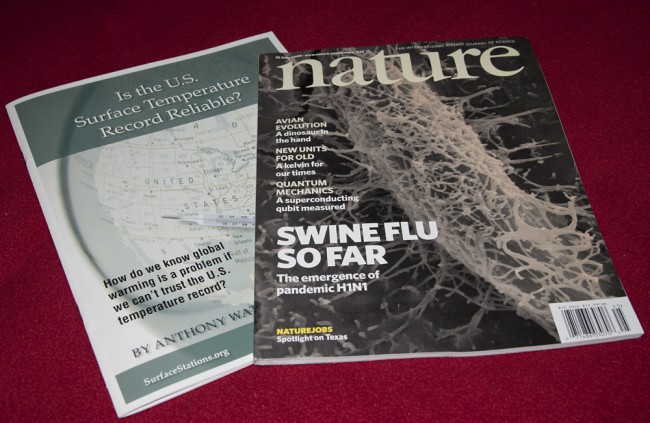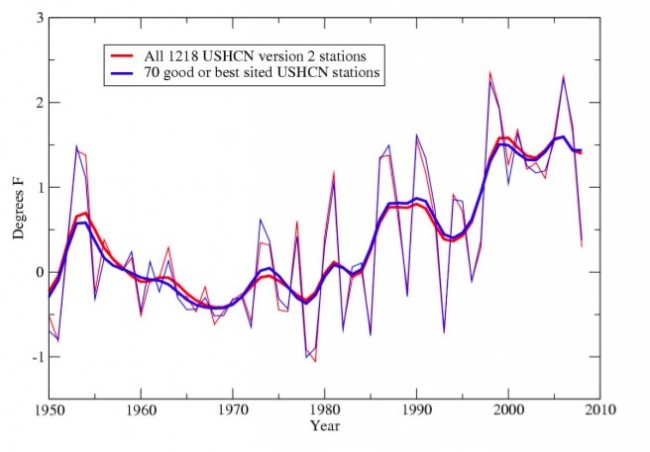15 July 2009
Watts Wrong With That- PLENTY
Posted by Dan Satterfield
Hundreds of TV weatherman (and Meteorologists who work in TV) around the country received a slick booklet a couple of months back. It was printed by the Heartland Institute, a libertarian think tank funded in part by Exxon and others. They recently held what they called a “Climate Conference” that itself was funded not by the NSF but by an interesting group of energy companies and right wing foundations. DeSmog Blog did some excellent journalism on this.
The front cover of this pamphlet touted an article by Anthony Watts (Labeled as a Meteorologist, but I can find no evidence he has a degree in any atmospheric science after serious looking). The gist of the article is that the U.S. Temperature record cannot be trusted. It implies that the warming that NOAA scientists have reported over the last century is based on faulty data.
Apparently he has sent legions of people to go around, and take pictures of hundreds of NOAA reporting stations to show that they are badly sited, and cannot be relied on. The article even has a few cherry picked examples of these badly sited stations. It concludes that we cannot trust what NOAA scientists are telling us because the data is bad. Apparently there are only about 70 good or excellent stations that are acceptably sited to Mr. Watts.
Before discussing the faulty logic in this little piece of propaganda, let’s be clear about what it is not. Specifically, it’s not Science. This was not published to alert NOAA scientists that there was a problem in their research. To do that, it would have been written in acceptable science form and submitted to a peer reviewed journal. (Since all of the issues it raises have long ago been investigated, and thoroughly settled- it would never get published anyhow)
Instead, the purpose of this pamphlet was to influence the TV folks who mostly have little or no background in Climate Science. The hope was that this would get mentioned on air, and in blogs written by them.
So WATTS WRONG with it??
Plenty.
It shows a fundamental misunderstanding of statistical analysis, and how the U.S. temperature record has been obtained. Certainly some stations are not as well sited as they should be, they were placed to record local weather, and not as a way to measure climate changes. No scientist has EVER had a set of perfect data. Such things do not exist, and there are always corrections that have to be made. In this case, you should remember that corrections for such things as urban heat islands, and micro climates, are made to adjust for biases.
More importantly, climate scientists are interested not so much in the temperature, but in the DELTA T. The change in temperature. A station with a cold or hot bias, will still show temperature changes. It may show them quite accurately.
Many times the badly sited stations tend to balance each other out. The robustness of the NOAA record has been shown statistically many times in many papers published in peer review. Detailed papers on how the U.S. Temp. record was constructed have been published and debated in numerous peer reviewed journals. One of the experts on this is Tom Karl, the director of the National Climate Data Center in Asheville, NC. He is also the president of the American Meteorological Society.
The NOAA scientists whose research, and science, were attacked in this pamphlet have every right to respond, and respond they did (Here comes the funny part).
They first explained how the record was compiled and went into detail on why the data is considered accurate. They went further though. They assumed that Watts was not WRONG. They took the 70 stations that Watts found acceptable and ran the data with those. They then compared it to their temperature record. See the graph below:
OOOOPS! Slain by your own argument!
There are a couple of morals to this story.
1. If you are going to tell a bunch of NOAA scientists they are wrong, then
1. Get a science education, and do your homework first.
2. Do the work to see if your hypothesis makes any sense, before you make a fool of yourself.
3. Send your work to a peer reviewed journal instead of a PR organization that takes money from Exxon.
It was worth the best laugh I had all month, and for that I am grateful! You can read the entire response from NOAA/NCDC here: response-v2.
Later,
Dan




 Dan Satterfield has worked as an on air meteorologist for 32 years in Oklahoma, Florida and Alabama. Forecasting weather is Dan's job, but all of Earth Science is his passion. This journal is where Dan writes about things he has too little time for on air. Dan blogs about peer-reviewed Earth science for Junior High level audiences and up.
Dan Satterfield has worked as an on air meteorologist for 32 years in Oklahoma, Florida and Alabama. Forecasting weather is Dan's job, but all of Earth Science is his passion. This journal is where Dan writes about things he has too little time for on air. Dan blogs about peer-reviewed Earth science for Junior High level audiences and up.
Let science speak first!
Gabriel
Nice… in my mind, I heard “Impaled on your own sword, Gilderoy” in Dumbledore’s voice…
The sad part is that weathercaster Anthony Watts never learns from his mistakes when he gets owned by his own negligence.